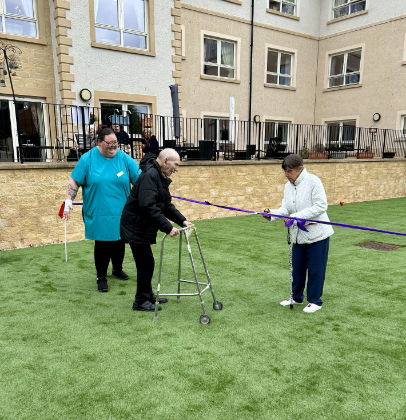How Much Do Care Homes Cost

It is a known fact that life expectancy across the UK has risen over the past few decades meaning there is a higher need than ever for a care home. However, this has been accompanied by a rise in care costs which is causing families to be concerned about whether they can afford a care home for their loved one.
In this blog, we will explore the average amount people pay for care, the different types of care available and any financial support that is offered through the local authority or NHS.
Average Care Home Fees Across the UK
UK care home fees are something that needs to be carefully looked at by an individual as care fees for residential care will be different for nursing care for example. The UK care guide states that the average care home fee rises each year. Nursing home fees are higher than residential care because of the specialist care a person will need. The most appropriate care type for someone in need of care will be determined through a needs assessment which will take place prior to moving into a care home.
There are numerous factors that contribute to the amount you pay for care including location, care types and facilities offered. Care homes located in or close to popular cities will likely cost more than care homes far from local amenities. Make sure you look into all the different factors that affect care costs before making a decision, so you can find the best place for you or your family member.
Nursing Home and Care Home Costs
Care homes and nursing homes across the UK will structure their fees differently depending on the level of care they provide, and the amenities and/or activities they offer. Residential care is the most basic care type, so the needs of the individual are lower than those needing nursing care. If residents choose to partake in any local excursions or use any facilities, this could also influence the way care fees are structured as each care home may or may not charge additionally for these. A majority of care homes and nursing homes will expect fees to be paid per week, whereas others adopt a pay-as-you-go approach.
When you move into a care home, you can typically expect the fees to include care services, accommodation and meals. Anything additional amenities such as any social activities or beauty treatments will need to be paid separately.

Residential Care Costs
Residential care is one of the most common types of care and the care home costs for this are lower than any other type. It is most appropriate for individuals who are able to mostly live independently but require assistance throughout the day with mobility, washing and dressing. This is an ideal way of life for many older adults because they can enjoy life at a slower pace and socialise with like-minded individuals.
When receiving residential care, you should typically expect to receive the accommodation, personal care and meals in the care home costs per week.
Nursing Care Costs
Nursing care costs are some of the highest you would expect to find in a care home. This is because an individual requires 24/7 assistance for both personal and medical care needs. If your loved one is unable to live independently at home due to having complex needs or a disability that exceeds the capabilities of a caregiver, then receiving around-the-clock nursing care in a care home would be most appropriate for them.
Similarly to residential care, a resident should expect to receive meals, personal care and accommodation as part of their care home fees but on top of this, nursing care will include medical care and treatment.
Respite Care Costs
When looking at the average weekly cost of care, respite care is typically higher as the care is temporary rather than permanent. Respite care is available to individuals who are recovering from an illness or hospital stay, as it means they can be monitored 24 hours a day whilst they recuperate. Alternatively, if a caregiver of an elderly person requires a short-term break from their care duties then respite care would be a good option for them.
To determine if respite care is the most appropriate option for you, the care home management would carry out a needs assessment to decipher the length of stay.
Dementia Care Costs
Another care type that often incurs higher fees is dementia care. Individuals who live with dementia tend to have more complex care needs and so the fees are higher in order to adequately provide specialist care and support. The team that you receive care from undergoes specialist training on a regular basis to ensure they can cater to each person living with dementia.
Care homes offering Dementia Care may have dementia-friendly activities and therapies available to enhance their well-being and reduce symptoms such as depression, stress and confusion.
What is Usually Included in the Care Home Fees Per Week?
The cost of care in a care home varies depending on the location and the specific services provided. Typically, care fees include daily accommodation, personal care, meals, and activities.
However, it's crucial to note that each care home is unique, and some may charge extra for supplementary services. When researching care homes, we would advise you to enquire about what is covered in the fees to avoid unexpected expenses.
To simplify the cost structure and prevent additional fees, certain care homes across the UK offer all-inclusive living. This means that all care services, facilities, and activities are included in the care home fees, providing residents with a comprehensive and transparent way of living.

An All-Inclusive Way of Life
The popularity of all-inclusive care homes is on the rise, primarily due to the peace of mind they offer residents. While the amount you pay for care may come at a higher cost per week, many individuals prefer this option because it eliminates the need to budget and provides peace of mind knowing everything is included.
The assurance of unexpected charges is especially comforting during the current cost of living crisis. Opting for an all-inclusive care home means residents receive comprehensive care, support, meals, and amenities without the worry of a sudden rise in monthly costs.
It's worth noting that all-inclusive care homes vary in terms of the level of care provided, as well as the activities and facilities they offer. To ensure the perfect match, you'll need to look at and compare multiple care homes in your desired location to find the one that best suits the needs of your loved ones.
Who is Responsible for Paying for Care?
Care home and nursing home fees are normally paid by the person receiving the care service, meaning they are self-funders. However, not everyone is in a position to do this. People who cannot afford to pay care home fees can request funding support from local authorities or through NHS funding. To qualify for this financial support, a means test is carried out which looks into the savings and assets of the person who requires care as well as their overall care needs.
If you are able to fund your care or your family members can support you, we would advise speaking to a financial advisor to make sure you understand everything that's involved and the potential risks associated with this.
What Financial Support is Available?
Eligibility for funding depends on individual circumstances. A common avenue is seeking local council funding, which involves a financial assessment to determine if a person's income and assets exceed a certain threshold determining whether or not they would be eligible.
For those with significant care needs or a 'primary health need', Complex Clinical Care provided by the NHS may be an option. NHS-funded care consists of a multidisciplinary team doing a personal assessment to see if an individual has a 'primary health need' or severe needs.
If neither NHS nor local authority funding is available, a deferred payment agreement may be an option. This is when the local authority covers care home fees, and when the individual's home is sold, the fees are repaid to the local authority, often with added interest. Equity release is also another option.
You should be aware that financial assistance isn't always guaranteed, and some care homes may not accept funding. It's wise to enquire about funding acceptance when considering a care home.
Self-Funding Care Home Fees
You are considered a self-funder if you pay for the full cost of your own care independently, and this will be appropriate for someone who has sufficient savings and assets to cover care home fees. This means a person is responsible for the costs of their care. If their care needs worsen, they may be able to receive financial help through the NHS but this isn't always guaranteed.
As mentioned above, care home fees will vary depending on the size of the care home, its location, and the care services and facilities offered. Moving into a care home is a big financial commitment so you need to carefully consider the amount you may be expected to pay. If you are looking at funding your own fees, we recommend contacting a financial advisor who will provide advice on the best way to manage your money.
Local Authority Funding
Local authority funding support refers to financial assistance provided by the local authority to individuals who lack the means to independently afford care homes or nursing homes. Eligibility is determined through a means test that evaluates savings, assets and any pensions.
It's crucial to understand that local authority-funded care typically covers essential care home expenses, including accommodation, meals and care. Additional services or amenities, such as trips, social activities, or personal items, may require payment by the individual or a family member, also known as a top-up fee.
NHS Funded Care
Individuals with complex or multiple health needs could be eligible for Complex Clinical Care, which covers the full expenses of nursing care in a care home or a nursing home. It is essential to remember that NHS funding is different to local authority and a means test is only used to cover accommodation costs.
Instead, to determine eligibility for NHS funding, a multidisciplinary team conducts a care needs assessment. This assessment evaluates a person's healthcare needs, considering factors like the nature, intensity, complexity, and unpredictability of their condition. Typically, individuals with physical or mental disabilities, terminal illnesses, or severe health conditions often meet the criteria for this type of funding.
Receive a Better Way of Life at Haddington Care Home
Haddington Care Home is situated in the picturesque town of Haddington, East Lothian where the friendly staff is dedicated to delivering exceptional care services. Haddington Care Home specialises in Residential Care, Dementia Care, Nursing Care and Respite Care, with a fully trained team available 24/7 to support residents. At Haddington Care Home, we strive to provide residents with the opportunity to fill their days with whatever brings them joy, maintaining their independence and dignity.



Our facilities have been built with comfort in mind, including our spacious lounges, varied activities program, hair salon and private secure gardens which enhance the quality of life for all our residents. Our friendly and committed team works closely with residents to ensure they continue doing what they love but also try out their new interests.
If you have any financial concerns regarding self-funding or local authority funding, our wonderful team is here to provide guidance and address any queries you may have. The cost of our care includes all personal care services, facilities and activities which provide residents with peace of mind. At Haddington Care Home we are committed to maintaining the highest standards of care and support throughout every stage of our residents' lives, providing a comfortable and warm setting where they can thrive in their environment.
Find Out More About Our Home in Haddington or Book a Tour Today
If you are looking to get in touch with a member of our team regarding our services, facilities or care home costs please give us a call on 01620 674880 or email info@haddingtoncarehome.co.uk and we will be in touch as soon as possible.





